John Hurrell – 26 November, 2023
With the doubling (stacking?) up of moving imagery in certain parts of the screen, even in ‘stable' spaces devoid of visual complexity, two things seem to happen. One is the occurrence of similes where conceptual likenesses become apparent: tropes become apparent that are not symbols or metaphors, so that themes suddenly emerge that hitherto seemingly were not deemed major. The other is when differences of classification materialise in the viewer's perception of people, animals or forms, previously clear distinctions now become blurred, so steadfast assumptions then crumble.
Auckland
Wu Tsang
One Emerging from a Point of View
Curated by Andrew Kennedy
12 November 2023 - 28 January 2024
Wu Tsang‘s wide screened film from 2019 features a sequence of partial and fully overlapping video projections, a technical method where two separate two-channel stories blend into each other to make an uncomfortable third ‘narrative’, as the juxtaposed blocks of moving image ‘double-expose’ and mingle. With this calculated screening confusion, the project toys with aspects of viewer interpretation, avoiding fixity of meaning and revelling (it seems—via its choice of subject matter) in a multitude of parallel ‘understandings’.
The show’s given title from this American video maker actually obfuscates. ‘One tentatively emerging from two clashing points of view’ would be more accurate. The competing narratives are set on the northeastern shore of the Greek island of Lesbos, positioned in the Aegean Sea between the mainland of Greece and Turkey.
One is about Yassmine, a young transgender Moroccan woman visiting the refugee camp at the village of Moria after travelling through Turkey, and the other concerns Eirini, a photo-journalist documenting the huge influx of ‘boat people’ refugees being rescued by the local people of the village of Skala Sikamineas, many of them shepherds. She very briefly appears in the film, while Yassmine’s story is mingled with a story about her being rejected by her family but she is desired by a king. He then tries to kill her but she escapes with the help of a goat spirit.
With the doubling (stacking?) up of moving imagery in certain parts of the screen, even in ‘stable’ spaces devoid of visual complexity, two things seem to happen.
One is the occurrence of similes where conceptual likenesses become apparent: tropes become apparent that are not symbols or metaphors, so that themes suddenly emerge that hitherto seemingly were not deemed major. For example, the large number of refugees tragically drowned in the sea is suggested by an eternally long line of shepherded goats rushing into a sheltering pen for the night; likewise a very long row of fishermen slowly hauling and coiling a long rope comments on the implication of piles of detritus of smashed up boats and clothing left drying on fences.
The other is when differences of classification materialise in the viewer’s perception of people, animals or forms, previously clear distinctions now become blurred, so steadfast assumptions then crumble. Men and women stop being binary opposites and fuse, mythological time is mixed with the contemporary era, sheep are confused with goats, flickering lights from fires spread out on a beach transmute into stacked parallel lines on shimmering distant hills.
Within this potpourri of scrambled up and blended fragments of narrative, with its unnerving juxtaposed coalescing, we experience haunting Greek music, lively erotic dancing, disturbing and calamitous drama—and even occasional humour via the bleating, leaping, and sprinting animals.
Remarkably the film is not dry or lacking in sensuality or emotional intensity. It features many types of beautiful outdoor light (day and night: sunshine and electric), varied island vistas and unpredictable screen divisions with the dual projections, all the while retaining a disturbing sense of tragedy and suffering from the many families caught up in such a precarious and deadly displacement.
John Hurrell
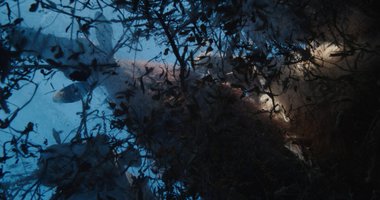

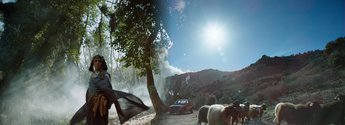
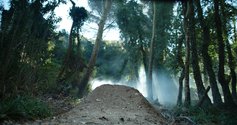
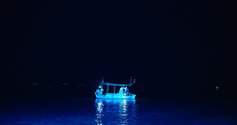
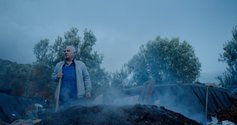
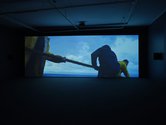
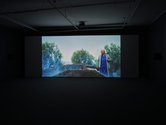
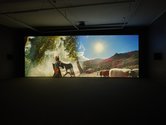
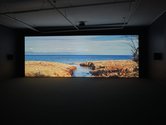
 Advertising in this column
Advertising in this column Two Rooms presents a program of residencies and projects
Two Rooms presents a program of residencies and projects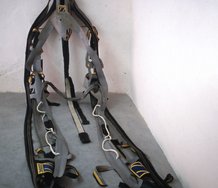
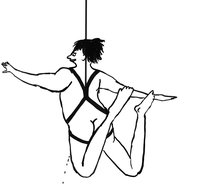

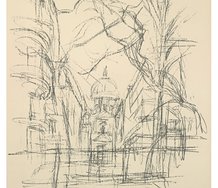
This Discussion has 0 comments.
Comment
Participate
Register to Participate.
Sign in
Sign in to an existing account.